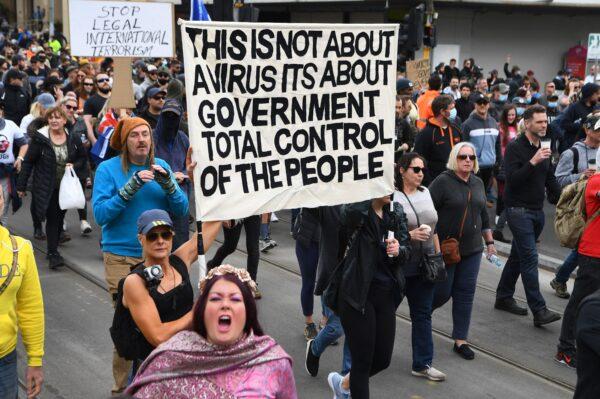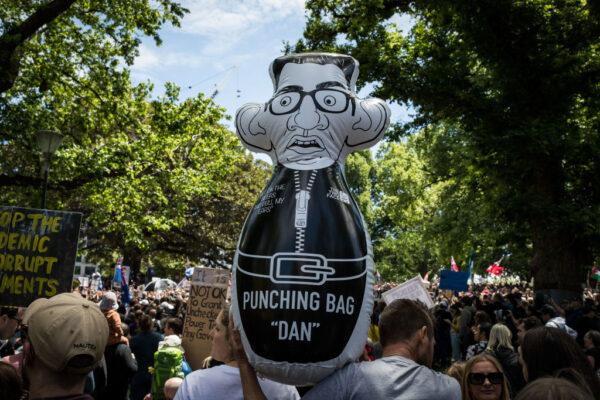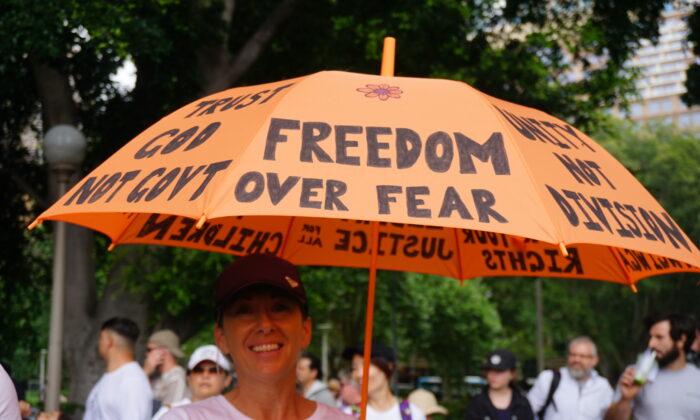Every weekend, numerous rallies are held in the major cities and regional centres against the COVID-19 vaccine mandates and restrictions. These rallies are mostly ineffective and meaningless exercises to halt the transformation of Australia into a bureaucratic and illiberal state.
The emergence of a period of capricious authoritarianism in the history of Australia has revealed the ugliness, hidden until recently.
Undoubtedly, Australia’s health bureaucracies have adopted oppressive policies, arguably to safeguard the health of citizens.
However, the unrelenting, inflexible, and disproportionate use of unchecked power, characterised by the QR code tyranny, superimposed with very intrusive facial recognition technology, has made Australians into a compliant and docile population.
Private employers, who encourage their workforce to vaccinate, support vaccine mandates, imposed by state health bureaucracies.
Even the local bridge clubs in Brisbane now require all players to be fully vaccinated by Dec. 17, when the Queensland state border is scheduled to be open.
These are draconian edicts, which will result in a two-tier Australia where some people are more privileged than others, involving the distribution of burdens and benefits simply on the ground of people’s vaccine status.

The predictable unpredictability, which is so typical of the imposition of health orders, is a response to the arrival in Australia of new variants of the COVID-19 virus, including the most recent, Omicron, which resulted in the closing of Australia’s international borders.
The intrusive intervention of the health bureaucracies and compliant businesses into the lives of law-abiding citizens reveals that governments have shamelessly embraced paternalism as a principle of legislation.
The implementation of this principle results in the imposition of intrusive health decisions which individuals should be making themselves.
These bureaucracies and politicians are, in effect, embracing the “Nanny State” which seeks to achieve its objectives, by prescriptively controlling, forbidding, or compelling the behaviour of individuals.
Indeed, the “Nanny State” is coercive, for example, by compelling people to vaccinate or to stay at home and lose their rights.
So, the question “What could people do, if anything at all?” should be asked. This question leads to the topic of civil disobedience.
Before addressing the mysteries of civil disobedience, it is useful to refer to a sobering statistic. In 2008, George Roberts, discussing an international survey on ABC News, reported that half of Australia’s population cannot read or write properly.
Since then, this percentage may have increased because “reading” and “writing” are flexible concepts.
A deficient education system that despises Western civilisation and promotes political correctness has facilitated this rapid decline.
This is a relevant statistic because a person’s reading and writing abilities affect their capacity to think, and therefore they become obedient and slavish accepters of government propaganda, and proponents of the atrocious transformation of Australia into an illiberal state. Thus, civil disobedience requires people to be able to think for themselves.

In the context of COVID-19, civil disobedience may involve a deliberate violation of a mandatory vaccination mandate on the ground that the mandate is incompatible with “higher” moral or religious principles, civil rights, or natural rights.
An assessment of the appropriateness of an act of civil disobedience depends, at least in part, on the extent to which the disobedient behaviour is “rational.” The identification of its essential features could clarify the meaning of “rationality.”
First, an act of civil disobedience could be judged by its effectiveness, namely its prospect of success. The effectiveness of an act affects its rationality because an ineffective act is not likely to have any societal impact and, hence, may not result in social change.
Second, a commitment to rationality requires that the higher principles, invoked by the lawbreaker as justification for an act of disobedience, are balanced against other “higher” principles that require obedience to orders imposed by government authorities.
Third, the rationality of an act of disobedience is judged by the willingness of a lawbreaker to accept the penalty imposed for breaching a vaccination order.
This is because the willingness to accept the penalty proves that the lawbreaker adheres to the existing legal system while, at the same time, expressing his or her disagreement with the imposition of vaccine mandates. The willingness of the lawbreaker to accept punishments to eradicate the targeted injustices awakens the conscience of society.
Fourth, the requirement that an act of civil disobedience be rational also requires that the action be commensurate with the alleged injustice which caused a person to disobey the law. Thus, there is a requirement of proportionality.
In this context, many health orders imposed on people are ridiculously disproportionate to the objectives the health bureaucracies and oppressive governments want to achieve.
These four requirements—effectiveness, striking a healthy balance, willingness to accept the penalty, and proportionality—guarantee that an act of civil disobedience is rational. These requirements ensure that an ardent desire to rectify egregious violations of civil rights motivates persons who contemplate civil disobedience.
Undoubtedly, there are several reasons why civil disobedience takes place. In general, civil disobedience becomes a societal problem when the normal channels of social change do not function properly anymore, or when the authorities disregard serious grievances.

A system does not function anymore when privileged groups have entrenched power positions in society and use their power to impose their will on weaker or vulnerable classes of people. This is precisely what may be happening in our COVID-19 era.
Civil disobedience, with an intent to challenge disproportionate health orders, is an example of legitimate political activity.
So, it is a most appropriate and acceptable way to respond to the oppression by the health oligarchy and governments bent on increasing their power.
Even when the COVID-19 pandemic is behind us—and this may take a long time—Australia will be irretrievably changed for the worse.
This is because our rights will from now on always depend on the largesse of a magnanimous government that could easily take them away at the slightest provocation, especially in the field of health.
For him, people are only able to save themselves if the spirit of liberty “reasserts itself in time and the people not only throw out the party which has been leading them further and further in the dangerous direction but also recognize the nature of the danger and resolutely change their course.”





